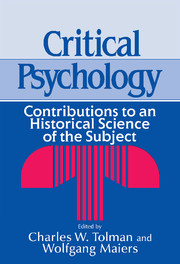Book contents
- Frontmatter
- Contents
- Preface
- Acknowledgments
- Contributors
- Critical Psychology
- 1 Critical Psychology: An Overview
- 2 Critical Psychology: Historical Background and Task
- 3 Societal and Individual Life Processes
- 4 Experience of Self and Scientific Objectivity
- 5 Psychoanalysis and Marxist Psychology
- 6 Emotion, Cognition, and Action Potence
- 7 Action Potence, Education, and Psychotherapy
- 8 Personality: Self-Actualization in Social Vacuums?
- 9 The Concept of Attitude
- 10 Client Interests and Possibilities in Psychotherapy
- 11 Play and Ontogenesis
- 12 Functions of the Private Sphere in Social Movements
- Bibliography
- Index
4 - Experience of Self and Scientific Objectivity
Published online by Cambridge University Press: 21 March 2010
- Frontmatter
- Contents
- Preface
- Acknowledgments
- Contributors
- Critical Psychology
- 1 Critical Psychology: An Overview
- 2 Critical Psychology: Historical Background and Task
- 3 Societal and Individual Life Processes
- 4 Experience of Self and Scientific Objectivity
- 5 Psychoanalysis and Marxist Psychology
- 6 Emotion, Cognition, and Action Potence
- 7 Action Potence, Education, and Psychotherapy
- 8 Personality: Self-Actualization in Social Vacuums?
- 9 The Concept of Attitude
- 10 Client Interests and Possibilities in Psychotherapy
- 11 Play and Ontogenesis
- 12 Functions of the Private Sphere in Social Movements
- Bibliography
- Index
Summary
Prior to 1968 our institute regularly observed the beginning of the new semester by holding a tea party. In an atmosphere of candlelight and biscuits, firstsemester students were introduced to the faculty members and encouraged to feel at home with the study of psychology. On these occasions the director of the institute at the time made a humorous little speech, the quintessence of which was the following. Beginning students should forget everything they had previously heard or believed about psychology; from now on everything would be different. Especially they should abandon any hope that the study of psychology would have anything to do with them, their personal experiences and problems, or be able to help them in overcoming individual difficulties or anxieties. Such expectations were prescientific and would prove, more likely than not, an obstruction to the acquisition of an acceptable motivation for study. Rather it was important to understand that psychology is a science like all others and, as such, concerned with objective knowledge, and that whoever wants to learn and practice this science must accordingly put aside subjective opinions, that is, what one thought one knew from one's own experience, in favor of what was now designated as the scientific aspiration for knowledge … and so on and on in this vein.
Words like these by our former director still describe the methodological self-understanding of mainstream scientific psychology.
- Type
- Chapter
- Information
- Critical PsychologyContributions to an Historical Science of the Subject, pp. 65 - 80Publisher: Cambridge University PressPrint publication year: 1991
- 15
- Cited by

